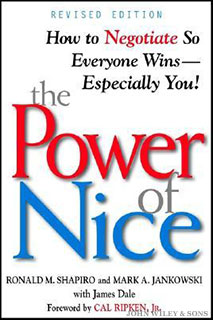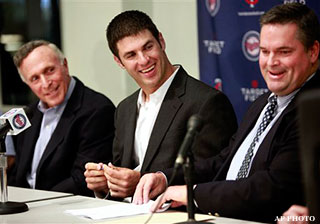Whether in business or daily life, negotiations are so despised that Satan himself is present during any discussion of an agreement's terms. When someone is forced to sign a contract with a business or person they don't like, it is almost immediately referred to as a deal with the devil. When a contract is dense and loaded with stipulations, readers are constantly reminded to pay attention because the devil is in the details. And of course, when two sides are trying to agree on something, someone for each party has to be the devil's advocate.
For these reasons, many people who negotiate for a living -- lawyers in general or sports agents in particular -- work hard to earn the coveted "tough negotiator" reputation. Ruthlessness, in the sports contract world, tends to be a virtue for gaining clients (see: Scott Boras). But what about the power of being nice? What about the benefit of stepping up to a bargaining table with a smile on your face rather than a sword in your hand? Could this strategy possibly work?
The answer, flying in the face of all anecdotal evidence and common misconceptions about negotiations, is amazingly "yes." According to Ron Shapiro -- New York Times best-selling author, founder of the Shapiro Negotiations Institute and baseball agent who has represented more major league Hall of Famers than anyone else -- being pleasant can be powerful.
"My first book, The Power of Nice, was about being a great negotiator in a way that you don't have to be so aggressive that you tear relationships apart," Shapiro says. "In the final analysis, relationships count."
Putting a premium on relationships, not ruthlessness, has allowed Shapiro to successfully represent a unique subset of superstars, including Cal Ripken Jr., Jim Palmer, Kirby Puckett, Brooks Robinson and Joe Mauer. See the theme? These are local guys who chose to stay with their original franchise and build roots in the community.

"As an athlete, becoming an institution in a city is incalculable in its value," says Shapiro, whose latest book, Perfecting Your Pitch: How to Succeed in Business and In Life by Finding Words that Work, will be released Friday. "But I don't go to a player and say 'think of the incalculable value' when we begin to talk about staying with the hometown team. The contracts these guys sign are always at the cutting edge of dollars. And those who choose to stay with their hometown team, guys like Kirby Puckett and Joe Mauer, have much more challenging negotiations. If they make it known that they have a strong desire to stay, then you really can't negotiate."
And yet, Mauer signed a New York-level contract for eight years, worth $184 million in 2010.
"What some of the players who are movers don't realize is the unbelievable value of relationships," Shapiro explains. "When a guy like Ripken decides he wants to sink his teeth into a community and build a business there and raise his kids there and start his foundation there, communities rally around them. When Kirby Puckett was going blind, the entire city rallied around him and supported him. That's why he was able to say in his Hall of Fame speech that, 'it may be a cloudy day in my right eye, but the sun is shining in my left eye.' Guys like Roger Clemens and A-Rod have lost that. These guys are rootless and they act like rootless people."
Negotiations, by their very nature, are difficult. The Latin etymology of the word negotiate literally means "lack of leisure", from neg, meaning "not" and otium, meaning "ease, leisure." So if an athlete wants to stay with a team, and the team deep down knows that, how do you come to an agreement with the team for a salary that is commensurate with what may have taken place in a bidding war? For that answer, Shapiro goes back to his very first client, Baltimore Orioles legend Brooks Robinson.

At the time, in the early 1970s, Shapiro was working as the Securities Commissioner for the state of Maryland and had developed a reputation for busting up frauds and schemes that were being perpetrated on wealthy citizens. Before that, he had been a civil rights lawyer, handling draft issues for men selected to the armed services, among other areas. If these sound like extraneous pieces of information to Shapiro's story, they're not.
"One day while I was the Securities Commissioner, I got a phone call from the owner of the Orioles," Shapiro says. "He told me that one of his legends was about to go bankrupt and needed help. He said that he knew I had also helped his nephew with a draft problem and asked if I'd help him. So here we have civil rights law and securities law converging to introduce me to Brooks Robinson."
Shapiro was so successful in helping Robinson out of his money problems that the Orioles icon asked him if he'd negotiate his last contract. That's how Shapiro got involved representing baseball players -- and that is where his education in sports negotiations began.
"At the time, the Orioles wanted to offer Brooks less money than he was making," Shapiro explains. "So I prepared like hell to show the Orioles why they shouldn't reduce Brooks' pay in his last contract. I did as much research as possible and I walked in to meet the general manager, Hank Peters, and laid out my case. I mean, I felt so good about what I said that I concluded that he should get more money. When I was done talking, Hank just looked across the table at me and said, 'Ron, I'll get back to you.' I took note right then and there that great negotiators should talk less and listen more. I should do what Hank did."
Robinson would end up getting less money, but later in the season, when the Orioles were trying to qualify other players for the roster, Peters asked Shapiro if Robinson would make some concessions to help the team out. Shapiro referenced the deal earlier and in exchange for Robinson complying, he got the difference in the original contract, which was $20,000.
"A good negotiation involves getting what you want while giving people what they want," he says. "We had a good relationship with the Orioles and they had a 'Thank Brooks Robinson Day' and Brooks got his money and the Orioles got their roster."
This speaks to another point that Shapiro makes in his talks and in his books, and that is that negotiations are never over.
"Don't conduct negotiations as a one-time transaction," Shapiro told an audience while giving a talk at Harvard Law School, his alma mater. "You have to see it as a long-term relationship."
Case in point, after the Brooks Robinson deal, other players began inquiring about Shapiro's services, including other O's legends Eddie Murray and Jim Palmer. As word of mouth snowballed in Baltimore's clubhouse, so did Shapiro's client list, which topped 20 Orioles players when the club won the World Series in 1983.
"Nobody will ever represent that many players on one team again," he says. "It was just a unique constellation of events that made it happen."
At his peak, Shapiro and his firm represented about 40 MLB players and between 30 and 40 minor league players. With each new client, Shapiro would hone and tweak his negotiating strategies to become more effective. For instance, early in his career he admits the he was too eager to jump right in to the meat of a negotiation.
"In my younger days I was itching to get to the bottom line too fast," he says. "I wasn't very effective at probing or listening. Over time I began to develop my prep skills and my probing skills."

As an example, when asked how he would handle his first negotiation with Hank Peters about Brooks Robinson today, rather than 35 years ago, he knows immediately what he would do differently.
"I would do all of the same preparation that I did before, but rather than jump right into making my case for Brooks, I'd go in and ask Hank how he felt about Brooks," Shapiro says. "I'd ask him what he based his reduction on and what analysis did he have to support that. I'd ask him about how the organization felt about Brooks' contribution to them, and how he felt about him for the upcoming season. Then we'd go from there."
To do this type of probing effectively, winging it is not an option. Over the years, Shapiro has developed a system for scripting out how he wants his negotiations to go so that there is no hesitancy when it comes to asking for what he wants. The final evolution of this process is featured in his new book.
"The seminal work of my system is The Power of Nice," Shapiro says. "But after that came out, people would ask me, 'what happens if some people just aren't nice?'. So I wrote Bullies, Tyrants and Impossible People: How to Beat Them Without Joining Them. Then people would ask me, 'what's the most important thing you do to be successful?' And I always say that I'm not the smartest guy in the room, but I'm the best prepared, which is why I wrote Dare to Prepare: How to Win Before You Begin.
"After that, as I found myself advising teams where I wasn't representing players, like the San Antonio Spurs or the Baltimore Ravens, I realized that whenever anyone had a problem, I would walk them through my preparation process and I'd tell them to script out how you want to explain your position. This led to Perfecting Your Pitch."
Part I of the book centers on The Three Ds of perfecting your pitch: Draft, Devil's Advocate and Deliver. This section is set against several story lines, the most prominent of which is Joe Mauer's recent contract negotiations with the Minnesota Twins. Using the negotiation as an educational tool, Shapiro goes through the thought process used to determine the opening asking price for the negotiations, as well as all of the insight that went into every single piece of communication between his team and the Twins.

He juxtaposes this preparation with how he helped ordinary citizens who came to him needing assistance with real world problems -- from workforce disputes, to asking for a raise, to dealing with difficult family members, even to breaking up with a girlfriend or boyfriend.
This second list of issues is what makes up the back half of chapters in the book.
"I like to think of myself as a change agent," Shapiro says. "That's what I like to be described as. All of the things I've done have allowed me to help people; to raise their level of performance and their success. That's why I'm proud of Perfecting Your Pitch. There are over 40 examples of negotiations that extend to all of us, including how to confront sexual harassment, how to deal with managing a budget between spouses, how to make a sale at your price and so many more. The stories in the book are challenges that many of us face in life."
These challenges, when met with Shapiro's system for scripting, give readers an invaluable tool for turning a dreaded negotiation into an amicable deal.
"The reason why I write books is because I make a lot of mistakes," Shapiro says. "You learn from your mistakes and you improve from them."
Who better to learn from than a man responsible for more than $1 billion in contract negotiations?
Perfecting Your Pitch: How to Succeed in Business and In Life by Finding Words that Work is available for purchase from Amazon, Barnes & Noble and iTunes.
-- Jon Finkel is the author of The Dadvantage: Stay In Shape On No Sleep With No Time And No Equipment. Follow him on Twitter @Jon_Finkel.





